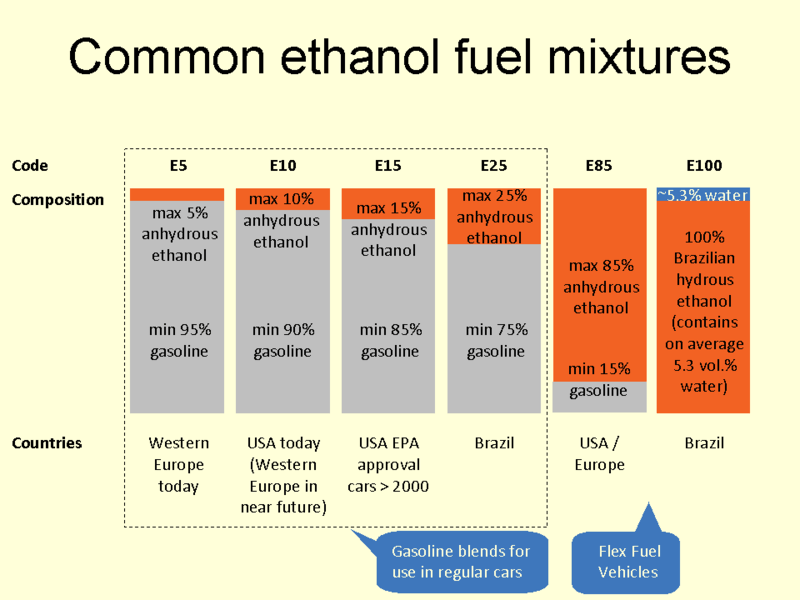Difference Between Ethanol and Bioethanol
Table of Contents
The key difference between ethanol and bioethanol is that ethanol is an organic compound derived from either a chemical routine or a biological routine whereas bioethanol is a form of ethanol which forms from the biological routine of ethanol production.
Ethanol or ethyl alcohol (the same compound found in alcoholic beverages) is useful as a fuel. We can produce it via either biological means or chemical means; if it is produced via the biological method, then we call it bioethanol. Bioethanol is a type of biofuel. It is also useful as an additive for petrol.
CONTENTS
1. Overview and Key Difference
2. What is Ethanol
3. What is Bioethanol
4. Side by Side Comparison – Ethanol vs Bioethanol in Tabular Form
5. Summary
What is Ethanol?
Ethanol or ethyl alcohol is an organic compound having the chemical formula C2H5OH. It is useful as a fuel. However, it is the same compound we find in alcoholic beverages. Most often, this fuel is used as a motor fuel; as a biofuel additive for gasoline.

Figure 01: Some Common Fuel Mixtures Containing Ethanol
It is possible to produce ethanol via either biological or chemical means. The major steps of producing ethanol via biological means include fermentation, distillation, and dehydration. During fermentation, microbes act on sugar to convert into ethanol. The distillation step involves the removal of microbes and most of the water. There, the product of fermentation is heated, so the ethanol fraction evaporates. Thereafter, we should dehydrate the end product of distillation in order to get a highly pure fraction of ethanol. In addition, the production of ethanol via chemical means include reacting ethene with steam.
What is Bioethanol?
Bioethanol is the form of ethanol we get from a biological routine. It is a clean fuel we can mix with petrol to run automobiles without modifying the engine. Usually, the production of this fule involves the fermentation of various materials that contain fermentable sugars or carbohydrates. There are four types of feedstock we can use for this production; starchy crops, lignocellulosic biomass, algal biomass, and industrial waste.

Figure 02: Corn is a Source for Bioethanol Production
Furthermore, this fuel is a renewable source of energy because biomass is renewable. Bioethanol does not produce oxides of sulfur or oxides of nitrogen. However, this compound has negative effects on food prices because the production of bioethanol requires large cultivable land for growing suitable crops.
Advantages of Bioethanol over Conventional Fuels
- A renewable source of energy
- Reduced greenhouse gas emissions
- Biodegradable, thus, far less toxic
- Ability to easily integrate into existing road transport fuel system
- Using bioethanol in older engines will also reduce carbon monoxide production
What is the Difference Between Ethanol and Bioethanol?
Ethanol or ethyl alcohol is an organic compound having the chemical formula C2H5OH while bioethanol is the form of ethanol we get from a biological routine. Therefore, the key difference between ethanol and bioethanol is that it is possible to derive ethanol from either a chemical routine or a biological routine whereas bioethanol is a form of ethanol which forms from the biological routine of ethanol production.
Furthermore, the production process of ethanol includes three major steps (fermentation, distillation, and dehydration) while bioethanol production requires pre-treatment of the substrate with acids or enzymes followed by fermentation. Also, a further vital difference between ethanol and bioethanol is that bioethanol is a renewable source of energy while ethanol is not.

Summary – Ethanol vs Bioethanol
Bioethanol is a form of ethanol that indicates its method of production. Hence, the key difference between ethanol and bioethanol is that ethanol is an organic compound derived from either a chemical routine or a biological routine whereas bioethanol is a form of ethanol which forms from the biological routine of ethanol production.
Reference:
1. Mukesh Doble, Anil Kumar Kruthiventi, in Green Chemistry and Engineering, 2007.
2. Dinesh Pratap Singh, Alka Dwevedi, in Solutions to Environmental Problems Involving Nanotechnology and Enzyme Technology, 2019.
Image Courtesy:
1. “Common ethanol fuel mixtures” By Hanskeuken – Own work (CC BY-SA 3.0) via Commons Wikimedia
2. “Cornfield in South Africa2” By Lotus Head from Johannesburg, Gauteng, South Africa – sxc.hu (CC BY-SA 3.0) via Commons Wikimedia
ncG1vNJzZmivp6x7pbXFn5yrnZ6YsqOx07CcnqZemLyue8OinZ%2Bdopq7pLGMm5ytr5Wau26x06GYp6ecYq6vsIyboKidpJ2ur7vLaA%3D%3D